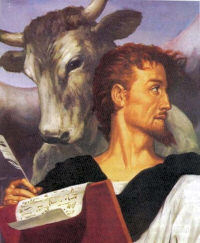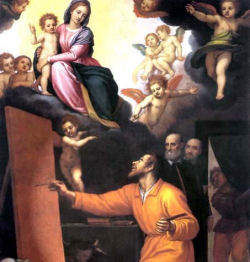“The harvest is abundant but the laborers are few.” (Luke 10:2)
A few decades ago, a team of salespeople would have mapped out their territory and assigned a particular town to each salesperson. The salespeople would go to every home in that town, and if the door opened, they would try to sell their product, whether it was vacuum cleaners, encyclopedias, suits, or anything else.
Now, in the age of huge department stores and Internet shopping, that personal approach isn’t practical anymore. Some might even call it old-fashioned and inefficient.
But that’s not the way Jesus looks at things. In fact, he used an “oldfashioned” approach when he sent out the seventy-two disciples. He could have just beamed his message of salvation into people’s brains and avoided all the messiness using ordinary human beings. Instead, he chose rough-hewn tradesmen and their wives to go out and deliver it personally. He sent them to demonstrate his message in action and then tell people that the kingdom of God was at hand.
We may wonder why Jesus would use such low tech means to announce the good news. He certainly isn’t against technology. He might indeed have used the tools of our media-drenched age if they had existed at the time. But then again, he might not. Think about the number of messages that are thrown at you every day. Would you pay attention to one more text message, one more tweet, or one more sound bite? Wouldn’t you be more likely to pay attention to a living, breathing person whose life has been changed by Christ? That’s why the disciples were so effective.
That’s also why Jesus has appointed you to be his witness. You have some very good news to deliver. Evangelization is not about delivering the exactly right facts. It’s about telling your own story of God’s mercy and presence—a story that only you can tell. So don’t worry about doing it perfectly. If God wanted perfection, he wouldn’t have chosen us humans to do the work. Just make yourself available, and let the Spirit work through you. If the seventy-two could do it, so can you!
“Lord, help me to see my corner of the world as your mission field. Give me a compassionate heart so that I can witness to your love and grace!”
2 Timothy 4:10-17; Psalm 145:10-13, 17-18

 St. Luke did not personally know our Lord, and like St. Mark, the author of the second Gospel, he is not included among the apostles. For this reason the Gospel chosen for their feast is the account of the sending forth of the seventy-two disciples. According to St. Jerome, St. Luke died in Achaia (Greece) at the age of 84, and it is unknown whether or not he died a martyr's death. His name means "bringer of light" (= luke).
St. Luke did not personally know our Lord, and like St. Mark, the author of the second Gospel, he is not included among the apostles. For this reason the Gospel chosen for their feast is the account of the sending forth of the seventy-two disciples. According to St. Jerome, St. Luke died in Achaia (Greece) at the age of 84, and it is unknown whether or not he died a martyr's death. His name means "bringer of light" (= luke).